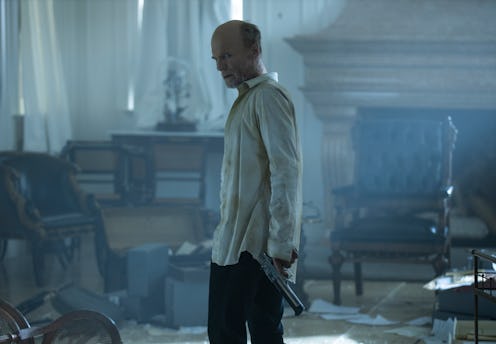Entertainment
Why We May Never Know If The Man In Black Is A Host On 'Westworld'

Spoilers ahead for Episode 4 of Westworld Season 3. Have you ever questioned the nature of your reality? William on Westworld certainly has. After a lengthy absence, he made his big return in Season 3's fourth episode, "The Mother Of Exiles," and his reappearance is likely to re-trigger one of the most popular debates among Westworld fans: is the Man In Black a host? Some viewers have been asking this question since Season 1, but speculation really kicked into overdrive in Season 2, as William himself started questioning whether he was truly human or not.
Unfortunately, "The Mother Of Exiles" did little to resolve the matter. Locked in the wreck of his mansion, William has gone (even more) insane since the end of Season 2. The ghost of his daughter Emily — who he shot in Season 2 having come to believe she was a host — is haunting the guilt-stricken William, refusing to let him forget his heinous act and continuing to stoke his deep-seeded paranoia over his humanity (or lack thereof).
As Emily points out, either William is a human in control of his own decisions — and therefore evil for killing his own daughter — or he's a host simply following his programming, and therefore merely a helpless passenger who has no control over his own actions. Is it better to be in control and evil? Or powerless and blameless?
By the end of the episode, Dolores-as-Charlotte has had her old enemy committed to a mental institution, and taken control of his votes on the board of Delos. Locked inside his cell, William is visited by another ghost: a memory of Dolores as the rancher's daughter, in the pristine blue dress he first saw her in. She congratulates William on finally reaching the center of the maze — which is typically a metaphor for when hosts realize their true nature and awaken to reality for the first time. He then asks Dolores, "Am I me?" Rather than answering his question, Dolores announces that William's game is finally at an end… and vanishes.
Does that scene symbolize William finally coming to grips with the fact that he's a host? Or simply that he's so far gone that he thinks he is one? Is William human or isn't he? The answer is still frustratingly elusive. But as Angela told young William when he first visited the park all those years ago, "If you can't tell, does it matter?"
The point of the question William (and viewers) is asking isn't finding out the answer; it's that, once the question has been asked, it can never be un-asked. Once William has questioned the nature of his reality, how can he ever be sure of anything again? If this is the end of William's story, it's definitely a dark and nihilistic one. Fortunately, we know that it's not — since a host version of William still has to end up back in the park running through a loop and undergoing fidelity tests in some distant, apocalyptic future teased in the Season 2 finale's post-credits scene.
How does William get from the mental institution into that loop? Who put him there? There are plenty of mysteries about William left to be solved… even if the nature of his reality is one that will forever go unanswered.
This article was originally published on